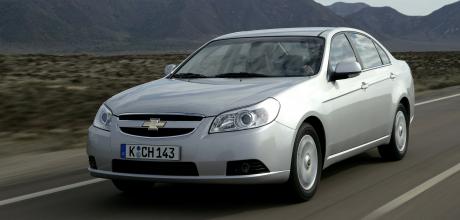Guilty Pleasure Chevrolet Epica

Cover up the Chevrolet bow-tie logo and anyone beyond the membership of the Society of Korean Saloon Apologists would struggle to name the manufacturer. It smacks of a car designed by committee to appeal to a global audience. As inoffensive as a local radio station playlist, although arguably more tuneful if you opt for the Porsche-engineered, transversely mounted, straight-six engine.
The fact that Chevrolet’s UK press office chose to omit Porsche’s involvement from the press pack speaks volumes about the Epica’s target audience. This was a large saloon – Epica by name, epic by nature, etc – designed for people who fancied a Ford Mondeo for the price of a Focus. Aesthetics, driver appeal and what your neighbours think over space, practicality and value for money. Even with a base price of just £13,000, this large Chevrolet was destined to become an #epicfail. Not that hashtags were really a thing when the Epica launched here in 2008, although Twitter had adopted them by the time the car bowed out in 2009. Nobody noticed its exit because nobody noticed its arrival. As epics go, this was less ‘Ben-Hur’ and more ‘Ben-Huh?’.
Even I’m struggling to find anything positive to say about the styling, because it’s just so… anonymous. ‘Not as bad as it looks,’ was the CAR headline in 2008, although sticking the Epica on the same spread as the Alfa Romeo Brera S was hardly playing fair. How many readers skipped to page 140 without noticing the Epica on page 139? How many Classic.Retro. Modern. readers are doing precisely the same thing in 2022? To be honest, the advert on page 112 is far more interesting. So why am I drawn to what is little more than a Daewoo Tosca with a light American makeover? Honestly, I don’t know. The regular reader of this column will know that I have a thing for Japanese, Korean and Malaysian saloons. Forced to trim my fleet of terribleness to one car, I’d hang on to the Toyota Camry, because I love the engineering, the unassuming styling and the simplicity of the interior. The 3.0-litre V6 engine helps, although I’m sure I’d be just as happy with the 2.2-litre four-cylinder unit (I know my bank manager would be). It’s just a shame that the vast majority of the surviving Epicas are powered by the 2.0-litre four-cylinder diesel rather than the 2.0-litre six-cylinder petrol. It’s also a shame that Chevrolet limited the flagship LT spec to the diesel, because opting for the six-pot means I’ll miss out on the joys of electronic climate control, heated leather seats with electric adjustment, a six- CD autochanger, auto-dimming rear-view mirror, 17-inch alloy wheels, rear parking sensors, auto lights and rain-sensing wipers. Saying that, living without these extras is arguably preferable to buying a flagship diesel with the knowledge that the front seatback pockets have almost certainly been used as a nightclubber’s sick bag. I’m sure the revellers appreciated the virtues of the Epica’s multi-link rear suspension while bemoaning the cabbie’s decision to favour diesel economy over the smoothness an of an inline-six.
In fairness to the cabbie, he knew that the 148bhp 2.0-litre diesel was 0.2 seconds quicker to 62mph than the 141bhp 2.0-litre petrol and only 5mph shy of its 129mph top speed. He also knew to avoid the power-sapping and tank-draining six-speed automatic transmission, which kind of makes the 2.0 VCDi LT manual the sweet-spot of the Epica range, assuming you can live without the inline-six. The lingering stench of White Lightning over an engine with input from Porsche; you pays your money and you takes your choice. Does anyone share my love of these guilty pleasures? Hello...?

